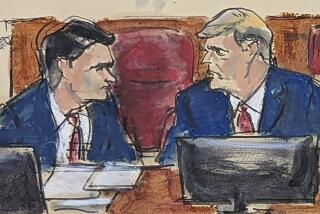Supreme Court Refuses to Intervene : Jury Selection Resumes in Deaver Trial
- Share via
WASHINGTON — Selection of a jury began Monday in the perjury trial of former White House aide Michael K. Deaver after the Supreme Court refused to intervene in the case, thus clearing the way for the beginning of testimony that could include President Reagan, the First Lady and a dozen present and former top Administration officials.
U.S. District Judge Thomas Penfield Jackson began questioning jurors in public after the high court let stand an appellate court ruling that sharply criticized Jackson for imposing too much secrecy in his earlier jury selection process last July.
The appellate court, in ordering Jackson to open up the process, said public screening of prospective jurors is mandated for criminal trials in line with a 1984 Supreme Court decision.
As questioning of jurors began anew, panelists received questionnaires that sought their opinions on more than 20 issues, including whether they hold “any personal opinions about alcoholism,” which is expected to be a key element in Deaver’s defense.
Deaver’s attorneys have said in court papers they will argue that his memory was clouded by excessive drinking when he gave allegedly false answers under oath last year to a federal grand jury and to a congressional subcommittee investigating his post-government lobbying activities.
Deaver has been hospitalized at least twice for treatment of alcoholism during the past two years, according to defense attorneys Herbert J. Miller and Randall J. Turk. Other major questions posed to prospective jurors concerned their attitudes toward the Reagan Administration and toward press coverage of the case. The questions are intended to determine whether jurors might have a bias that would prevent them from deciding fairly on the evidence.
By late afternoon, Jackson began questioning potential jurors on whether they knew anyone on a list of 220 possible witnesses. Besides the Reagans, the list includes Secretary of State George P. Shultz, Defense Secretary Caspar W. Weinberger, Treasury Secretary James A. Baker III, Atty. Gen. Edwin Meese III, Transportation Secretary-designate James H. Burnley IV and U.S. Trade Representative Clayton P. Yeutter.
The roster did not indicate which persons the prosecution has listed as potential witnesses and which the defense has tabbed.
Deaver, 49, once a close confidant of both Reagan and his wife, resigned in May, 1985, and established a Washington-based consulting firm. He became the subject of federal investigations centering on whether he had violated the 1978 Ethics in Government Act, which prohibits former high government officials from contacting their former agencies on behalf of a business client for 12 months after they leave government service.
After a 10-month inquiry, a court-appointed independent counsel, Whitney North Seymour Jr., obtained a federal indictment charging Deaver with five counts of perjury and “false declarations” for his testimony about his consulting activities, but cited no substantive violations of the ethics law.
More to Read
Sign up for Essential California
The most important California stories and recommendations in your inbox every morning.
You may occasionally receive promotional content from the Los Angeles Times.










